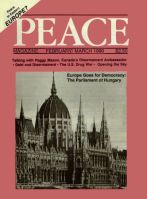
Peace Magazine Feb-Mar 1990, page 26. Some rights reserved.
Search for other articles by Metta Spencer here
THE FOREIGN Ministers from 23 nations-including both NATO and the Warsaw Treaty Organization (WTO)-witl meet in Ottawa February 12-14 to open negotiations toward an "Open Skies" Treaty. A subsequent meeting will be held in Budapest. When the treaty comes into effect, all signatory countries will be able-at short notice-to send reconnaissance planes over the territories of the other member states. The meeting promises to be historic in several respects: It is the first time leaders of the two blocs have met outside Europe, and it is the first time Canada has hosted a conference of this type. Already the Canadians and Hungarians have tried the idea out; a C-i 30 Hercules transport plane flew in over Hungary in early January and a Hungarian plane will fly over any part of Canada that Hungarians choose a few weeks later.
This confidence-building measure is by no means a new idea; President Eisenhower proposed it in 1955 but it was turned down because of other conflicts taking place during that grave phase of the Cold War. President Bush mentioned the idea again several months ago and was urged to develop it further by Prime Minister Mulroney.
Although the treaty will do nothing in itself to reduce military forces, it will provide excellent opportunities for verifying any arms reduction agreements that may take place.
A CYNIC might dismiss the Open Skies proposal as trivial, since both superpowers can observe virtually the whole planet with their "spy satellites," and need not depend on air reconnaissance. However, Ralph Lysyshyn, Director of the Arms Control and Disarmament Division of External Mfairs, who is responsible for organizing this conference, argues that the plan offers some excellent benefits. For one thing, it will not be available only to the superpowers, but also to nations that lack other means of verification.
Moreover, the airborne reconnaissance that becomes possible with "Open Skies" will be more accurate than pictures taken by satellites. It not true, Lysyshyn claims, that existing spy satellites can "read the newspaper over your shoulder"; and besides, even the superpowers have only a few of the best satellites. With "Open Skies," a multilateral verification system will become available. This objective has long been promoted by peace groups through an alternative scheme that has never been realized: an international satellite monitoring agency run by the U.N. For these reasons, most peace activisIs favor the treaty, albeit with one qualification: It will enable Soviet military leaders to come to Canada and watch the testing of cruise missiles. In some ways, this is an encouraging sign of openness. However, if by witnessing cruise tests, the Soviets imply that they hold a tolerant attitude toward that weapon, the net effect of "Open Skies" may be negative. It would impede the campaign by peace activists to stop all tests of such weapons. It would be ironical if the treaty merely turned the cruise missile tests into ceremonies for
displaying good will.

Peace Magazine Feb-Mar 1990, page 26. Some rights reserved.
Search for other articles by Metta Spencer here